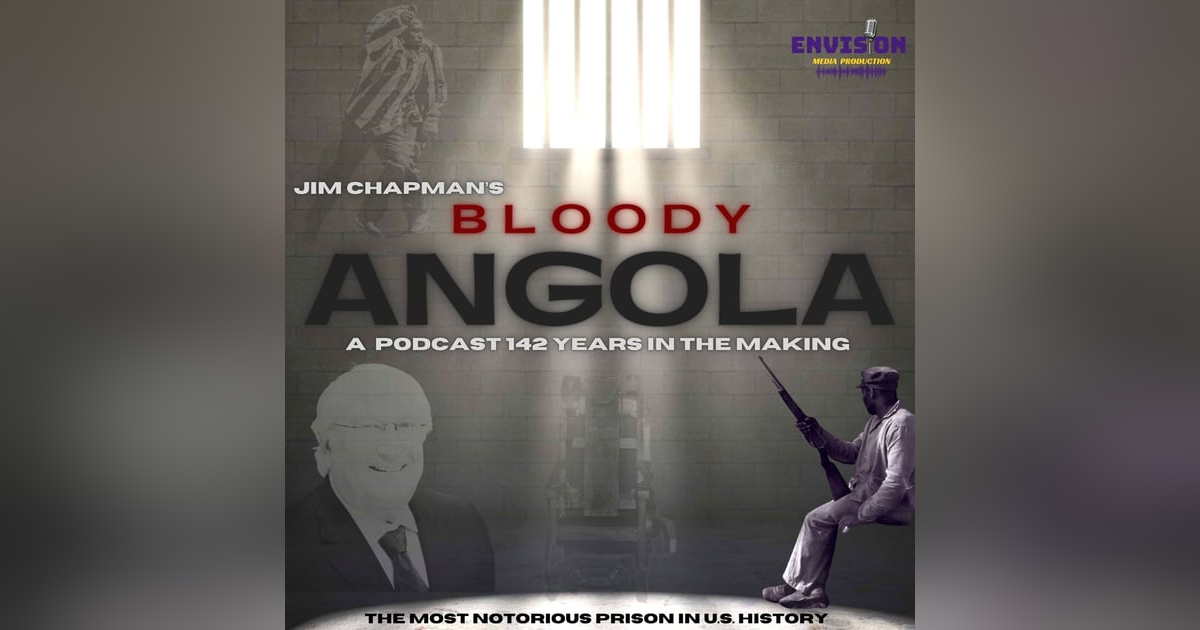Woody Overton and Jim Chapman of Bloody Angola Podcast tell the story of Clifford Etienne and the Louisiana Prison Boxing Program at Louisiana State Penitentiary and other prisons.
#cliffordetienne #theblackrhino #bloodyangolapodcast #podcast
Full Transcript
Bloody Angola Podcast ( THE BLACK RHINO)
Jim: Hey, everyone, and welcome to another edition of Bloody-
Woody: -Angola.
Jim: A podcast 142 years in the making.
Woody: The Complete Story of America's Bloodiest Prison.
Jim: And I'm Jim Chapman.
Woody: And I'm Woody Overton. Welcome, y'all, back to another episode of Bloody Angola. And we appreciate you listening and liking, subscribing, and all that good stuff.
Jim: Yeah.
Woody: We want to thank our Patreon members who are very instrumental in the show. Y'all stay tuned at the end of the show and we're going to talk about that some more. But, Jim, today we've got something-- We always said it'd be different. Today, this is a very, very interesting story, which I do have a lot of personal connection with.
Jim: I think we can title this one The Black Rhino.
Woody: The Black Rhino. Absolutely. I knew the Black Rhino when he was becoming the Black Rhino. This guy's name was Clifford Etienne. And that's, y'all, not from South Louisiana. It's E-T-I-E-N-N-E. Clifford Etienne grew up in New Iberia, Louisiana, home of tabasco. We call it affectionately the Berry. If you're from South Louisiana, they just call it the Berry. I got paternal brothers from down there and Bobby [unintelligible 00:03:03], if you're listening, shoutout, Probation And Parole, State of Louisiana.
Jim: But there's not much out there either. It's the tabasco plain if you're going to New Iberia pretty much.
Woody: It's growing up a lot over the years, but back then, and specifically in this time frame that I'm going to be talking about, Clifford Etienne was coming up and he was truly, basically a stud.
Jim: Yeah. He dominated in wrestling. He played baseball. Woody: Linebacker in football.
Jim: Track and field. He threw the disc and the shot. Woody: 6'2", 290 pounds.
Jim: Big boy. And was recruited by LSU, Nebraska, Texas A&M, Oklahoma, which these days are dominant, but back in those days were extremely dominant.
Woody: And recruited as a linebacker. And he just was a stud-stud. But sometimes, life happens and people try cocaine or different things or they hang with the wrong crowd. And that's what Clifford started to do. He could have had the world as his oyster, and he would it in later years and seems like history repeats itself, unfortunately. Back then, on a certain day in Lafayette, Louisiana, when Clifford was a young man--
Jim: Yeah, he was 18. As most 18-year-olds do, he was getting away with what he could, and him and four friends decided it would be a good idea to rob some customers at a shopping mall in Lafayette.
Woody: It was the only shopping mall in Lafayette at the time. And that was in 1988. I was there in 1989. And when USL was USL, now it's ULL. Go, Cajuns.
Jim: Yes.
Woody: But they robbed some people. And ultimately, he got busted.
Jim: Yeah, he got sentenced to 40 years. The first stint was Bloody Angola. That was where he first went.
Woody: And 40 years, y'all, would have been the minimum on armed robbery. It carries up to 99 years in the state of Louisiana. I think he was like 18 years old, he gets sentenced and they ship him to Bloody Angola.
Jim: That's right. Eventually, after a few transfers, he ends up at DCI.
Woody: That's Dixon Correctional Institute, y'all. That's where I would come to know him. What happened was I was working the working cell block, which y'all heard me talk about before. It's different than admin seg, because there's two men to a cell. But working cell block is where you only get sent for major rule violations. Basically, for street charges, whether you're smuggling, dope, you attack an officer, you rape somebody, or you fight with weapons. Now, I had two tiers of the working cell block that I ran and I can remember distinctly, Clifford Etienne was in the cell with a guy from Livingston Parish, a white guy from Livingston Parish. Now, Clifford Etienne is a black man, and they were in the next to the last cell at the end of the tier. The tier only had cells on one side, y'all, face the screen windows. They had a couple of black and white TVs down the tier.
But I would stop and talk to them all the time because the guy from the LP, I knew him from the street, and I knew him back from the club days. We knew some of the same people. You're not supposed to become friends and stuff with the convicts, which I submit to you that when you are working 12-hour shifts in two on, two off, three on, two off, two on, three off, but even on my days off, the Department of Corrections was always short and they had an on call list. Basically, I could work 30 days a month.
But I'm doing time just like they're doing time. I was doing time just like they ...
